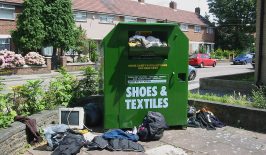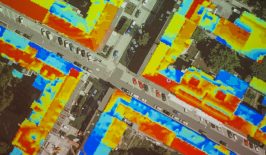Environmental Justice Foundation has today released a report and short film which highlights exactly how climate change infringes upon our most intrinsic rights.
Today marks Human Rights Day, the 44th anniversary of the adoption of the UN’s Declaration of Human Rights. Normally an occasion to reflect on the successes and subsequent abuses of such a declaration, Human Rights Day also provides an opportune time to advance discussion about how our rapidly changing world must still keep human rights at its core. As a sign of the times we live in, discussions about human rights these days invariably include how to safeguard our rights in the face of climate change.
British-based organisation, Environmental Justice Foundation (EJF), has teamed up with a slew of supporters, including two European MEPs, to illustrate not only how climate change will impact our rights in the future but also how global warming is already infringing on our rights, releasing a report and short film (preview below) called “A Nation Under Threat” which outline the struggles Bangladesh faces in maintaining rights to food, safety, healthcare and shelter in the face of climate change.
Analysing responses and recovery methods to natural disasters, as well as the way that climate change is affecting daily life in areas such as agriculture and access to safe drinking water, the report presents some alarming findings, such as:
- recovery after major natural disasters can take up to 18 months;
- how saltwater intrusion into open water sources threatens access to safe drinking water, sanitation and water for irrigation;
- increasingly erratic rainfall and temperatures affecting crop yields;
- how social inequalities such as education, skills and poverty correlate to people’s vulnerability during climate disasters; and
- the gradual decline in environmental security and how events such as floods and storms are forcing people to migrate from rural to urban areas of Bangladesh, placing huge stress on cities’ resources and resulting in a growing number of people living in slums.
The findings of this report, though specific to Bangladesh, highlight a greater problem: the reluctance of many governments to address climate change and resultant inability of populations to deal with the consequences of global warming.
Hurricane Sandy, which recently ravaged the east coast of the USA as well as several Caribbean nations, is a large-scale example of the way climate change is infringing upon our basic rights. While not necessarily directly caused by climate change, the superstorm was certainly intensified by irregular weather-related phenomena such as greenhouse gas emissions trapping more moisture in the atmosphere. The resulting force of Hurricane Sandy resulted in numerous deaths and destroyed countless properties, jeopardising people’s right to safety and shelter among other things.
Natural disasters which occur in smaller countries like Bangladesh (such as the intense floods the country is prone to) receive a fraction of the attention that disasters occurring in larger, more developed areas do. However, the lack of infrastructure means that extreme weather patterns have a devastating impact and serve to exacerbate rates of poverty and hunger in developing regions.
German Green MEP Ska Keller (who took part in putting together the report) states “The ones who didn’t contribute anything to climate change suffer the most; [they] have to leave their houses, their livelihood…we must also think about other solutions to assist the affected countries and people. This includes precautionary measures, better targeted development aid to deal with adaptation and catastrophe assistance. We also have to think how legal migration can serve as an adaptation strategy as well.“
Despite the well-documented abuses that occur every day across the world, the declaration of human rights demonstrates that each of us is born with the exact same intrinsic rights as everyone else on the planet, regardless of religion, race or socio-economic status. We are all equal and when it comes to the threats imposed by climate change, we are all in the same boat.
In line with the release of this report and accompanying video, EJF is calling for a new Special Rapporteur on Climate Change at the United Nations Human Rights Council. Join them in their campaign by signing the petition here.
Human Rights Day 2012: Climate Change and Human Rights from Environmental Justice Foundation on Vimeo.
Sources and links:
- Environmental Justice Foundation: ejfoundation.org
- Human Rights Day: un.org
- The Universal Declaration of Human Rights: un.org
Author: Anna Rees/ RESET editorial







